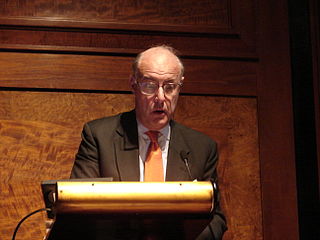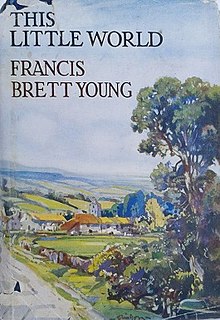
Andrew William Mellon, sometimes A. W. Mellon, was an American banker, businessman, industrialist, philanthropist, art collector, and politician. From the wealthy Mellon family of Pittsburgh, Pennsylvania, he established a vast business empire before moving into politics. He served as United States Secretary of the Treasury from March 9, 1921 to February 12, 1932, presiding over the boom years of the 1920s and the Wall Street crash of 1929. A conservative Republican, Mellon favored policies that reduced taxation and the national debt in the aftermath of World War I.

Francis Brett Young was an English novelist, poet, playwright, composer, doctor and soldier.

George Macaulay Trevelyan was a British historian and academic. He was a Fellow of Trinity College, Cambridge, from 1898 to 1903. He then spent more than twenty years as a full-time author. He returned to the University of Cambridge and was Regius Professor of History from 1927 to 1943. He served as Master of Trinity College from 1940 to 1951. In retirement, he was Chancellor of Durham University.

The phrase "Middle England" is a socio-political term which generally refers to middle class or lower-middle class people in England who hold traditional conservative or right-wing views.

Sir David Nicholas Cannadine is a British author and historian who specialises in modern history, Britain and the history of business and philanthropy. He is currently the Dodge Professor of History at Princeton University, a visiting professor of history at Oxford University, and the editor of the Oxford Dictionary of National Biography. He has been the president of the British Academy since 2017, the UK's national academy for the humanities and social sciences. He also serves as the chairman of the trustees of the National Portrait Gallery in London and vice-chair of the editorial board of Past & Present.
Sir John (Jack) Harold Plumb was a British historian, known for his books on British 18th-century history. He wrote over thirty books.

The social season, or season, refers to the traditional annual period in the spring and summer when it is customary for members of the social elite of British society to hold balls, dinner parties and charity events. Until the First World War, it was also the appropriate time to be resident in the city rather than in the country in order to attend such events.
Elizabeth Mavor was a British novelist and biographer.

The No. 1 Ladies' Detective Agency is a television comedy-drama series, produced by the BBC in conjunction with HBO, and based on the novels of the same name by Alexander McCall Smith. The novels focus on the story of a detective agency opened by Mma Ramotswe and her courtship with the mechanic Mr. J. L. B. Matekoni. The series was filmed on location in Botswana and was seen as one of the first major film or television productions to be undertaken in Botswana..
Harold James Dyos (1921–1978) was a British historian, known for his contributions to urban history. He wrote many essays addressing the issue of urbanization.

Ornamentalism: How the British Saw Their Empire is a book by David Cannadine about British perceptions of the British Empire. Cannadine argues that class, rank and status were more important to the British Empire than race. The title of the work Ornamentalism is a direct reference to Edward Said's book Orientalism, which argues the existence of prejudiced outsider interpretations of the East, shaped by the attitudes of European imperialism in the 18th and 19th centuries. It has also been argued to borrow tones from the title of Joseph Schumpeter's "Imperialism and Social Classes", which some historians see as the origins of the 'Ornamentalist' perspective in academic history'.

Susanna Mary Clarke is an English author known for her debut novel Jonathan Strange & Mr Norrell (2004), a Hugo Award-winning alternative history. Clarke began Jonathan Strange in 1993 and worked on it during her spare time. For the next decade, she published short stories from the Strange universe, but it was not until 2003 that Bloomsbury bought her manuscript and began work on its publication. The novel became a best-seller.
Gabriele Annan, Baroness Annan, was a German-born British author and literary and film critic, and the wife of the military intelligence officer, author, and academic Noel Annan, Baron Annan.

Victorious Century: The United Kingdom, 1800–1906 is a book by David Cannadine, the Dodge Professor of History at Princeton University and President of the British Academy. The book is about the Victorian era in nineteenth-century Britain. It begins with the Act of Union in 1800 and ends with the Parliamentary victory of the Liberal Party in 1906. Cannadine opens with the Charles Dickens' quote, "It was the best of times, it was the worst of times." He argues that Britain maintained its status as leader of the global economy and possessor of the largest navy in the world. At the same time, the country was plagued by internal problems and social conflicts. According to the Whig Interpretation of history, the "victorious century" represented a time of expanding democracy and wave of Parliamentary acts providing political reform and universal manhood suffrage. Cannadine argues,
"This was a country which saw itself at the summit of the world. And yet it was a society also convulsed by doubt, fear and introspection. Repeatedly, politicians and writers felt themselves to be staring into the abyss and what is seen as an era of irritating self-belief was in practice obsessed by a sense of its own fragility, whether as a great power or as a moral force. Victorious Century catches the relish and humour of the age, but also the dilemmas of a kind with which we remain familiar today."
The Penguin History of Britain is a popular book series on British history, published by Penguin Books. It appeared in nine volumes between 1996 and 2018, with many of the individual works subsequently being republished in several editions. Its general editor is David Cannadine, who also contributed a volume himself. Collectively, the books in the series span the period 54 BC to 1990 and include:

My Brother Jonathan is a 1928 novel by the British writer Francis Brett Young. It portrays the life of an idealistic young doctor working in the Black Country before the First World War, forced to deal with the consequences of his irresponsible brother Harold.

The House Under the Water is a 1932 novel by the British writer Francis Brett Young. It is one of his "Mercian novels", set in the West Midlands and Welsh borders.

This Little World is a 1934 novel by the British writer Francis Brett Young. It is set in a Worcestershire village in the early 1920s, where the recent First World War presages social change. It has a number of similarities with another of his books of the period Portrait of a Village, published three years later.

Portrait of Clare is a 1927 novel by the British writer Francis Brett Young. A commercial success, it also won the James Tait Black Memorial Prize.














